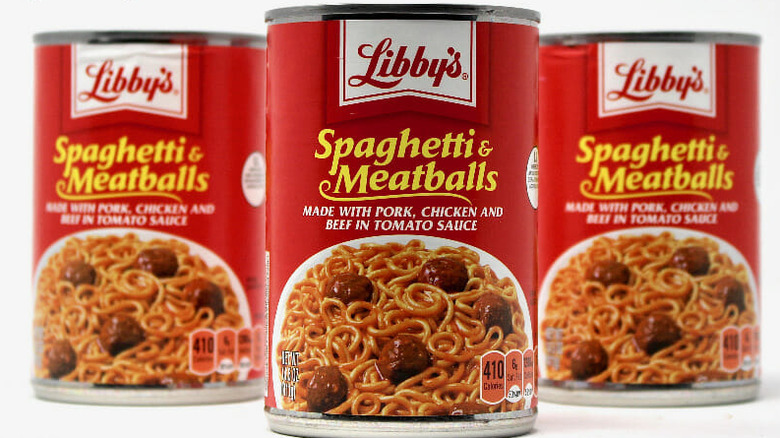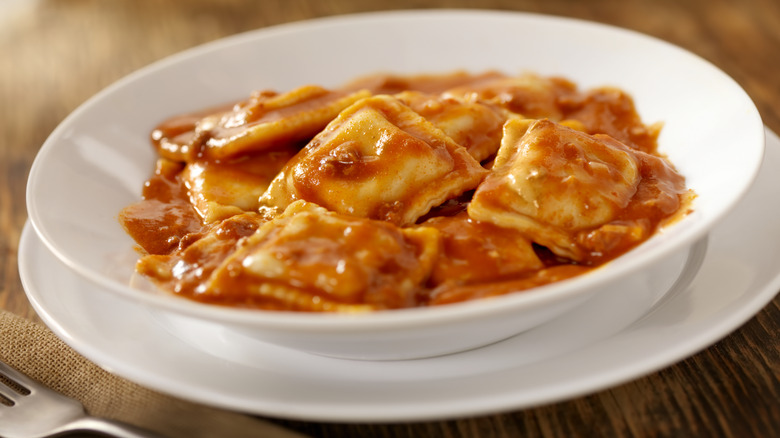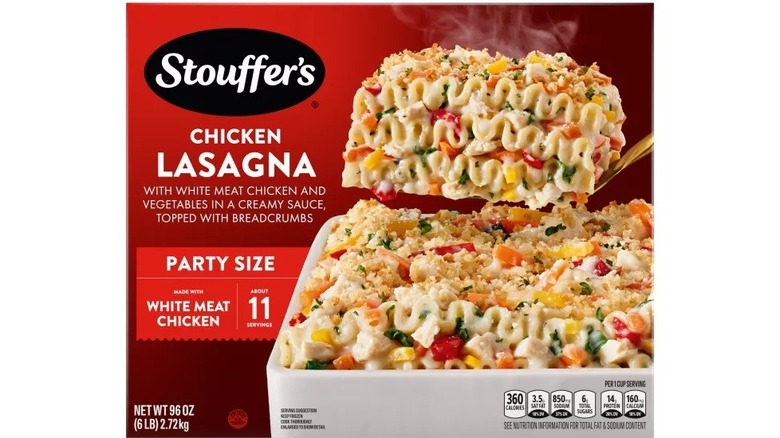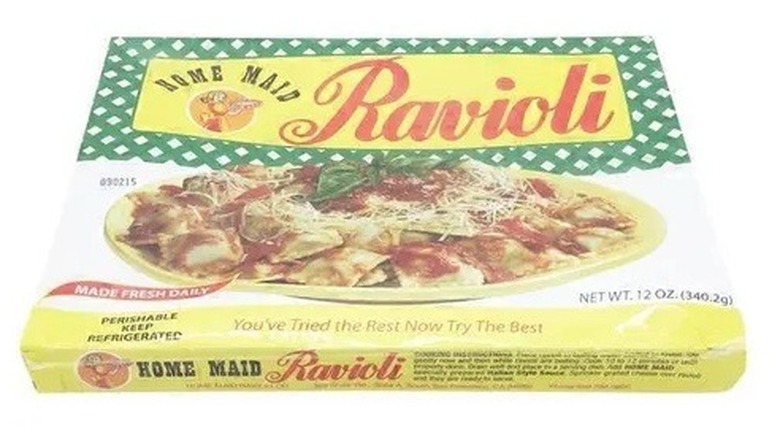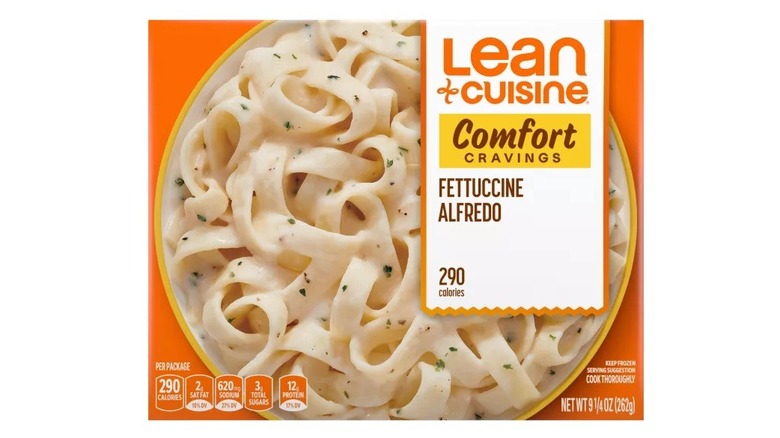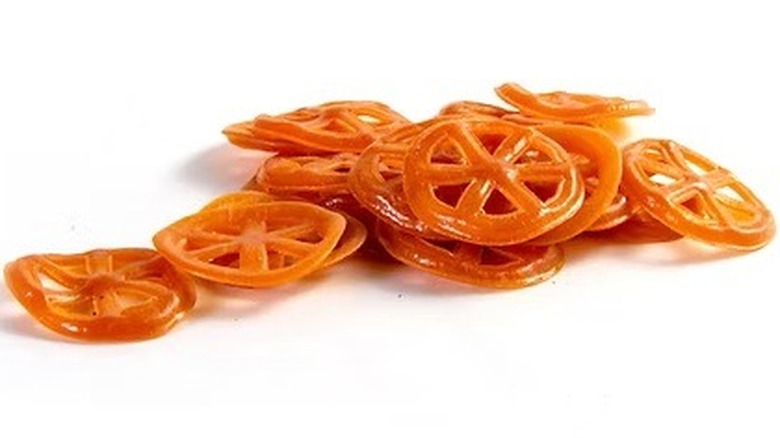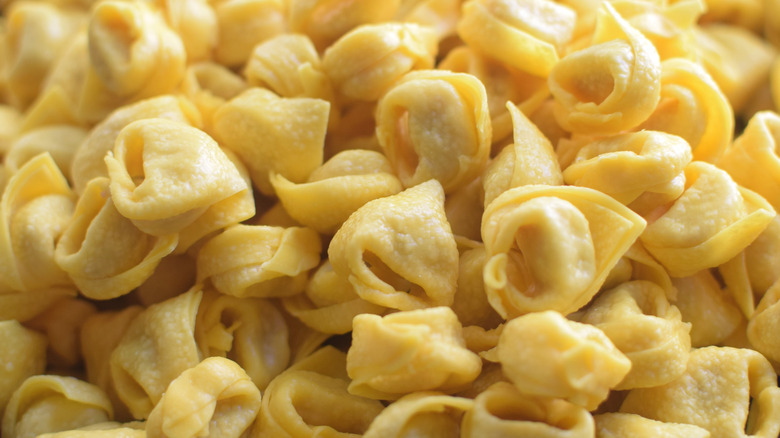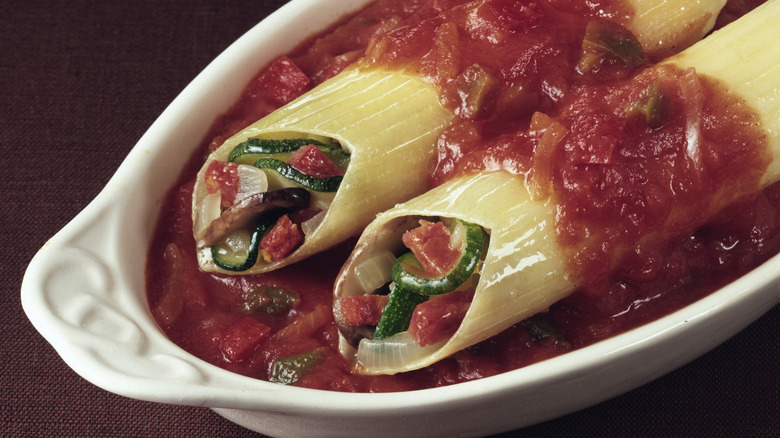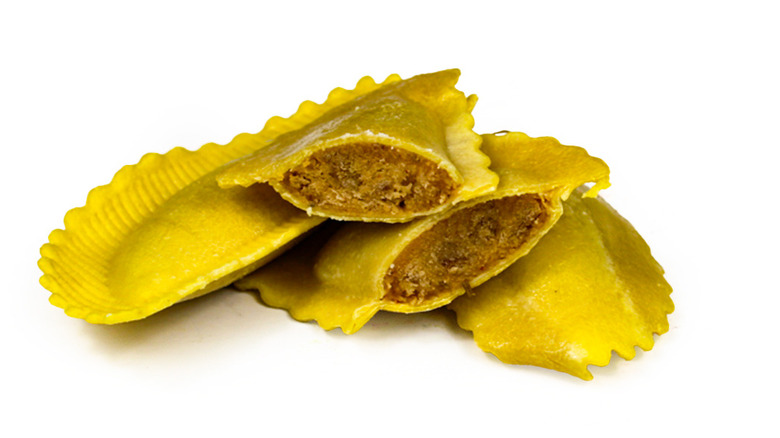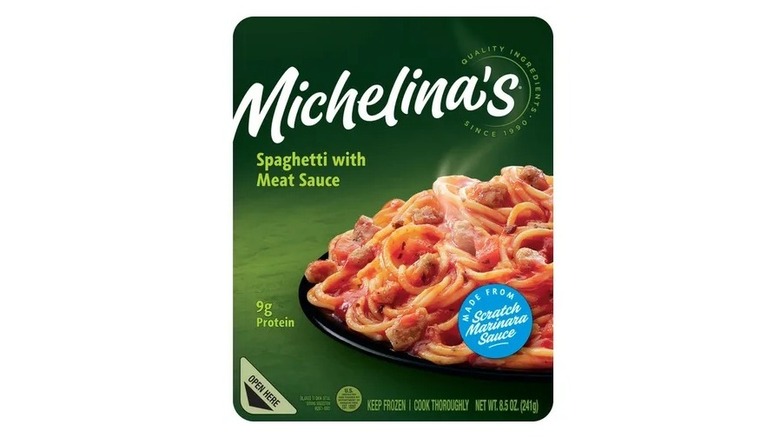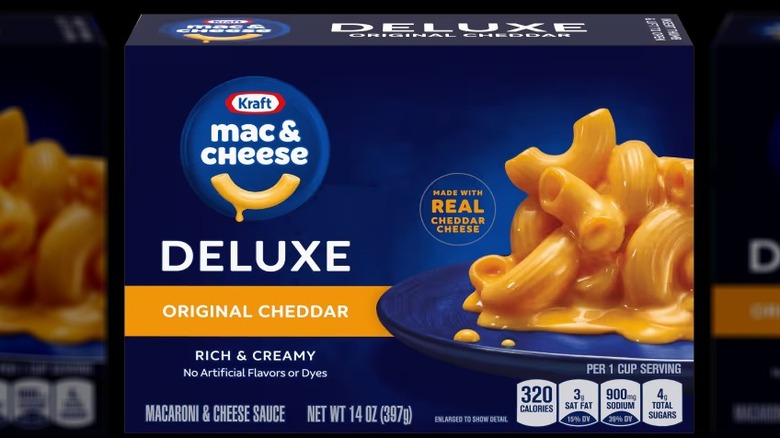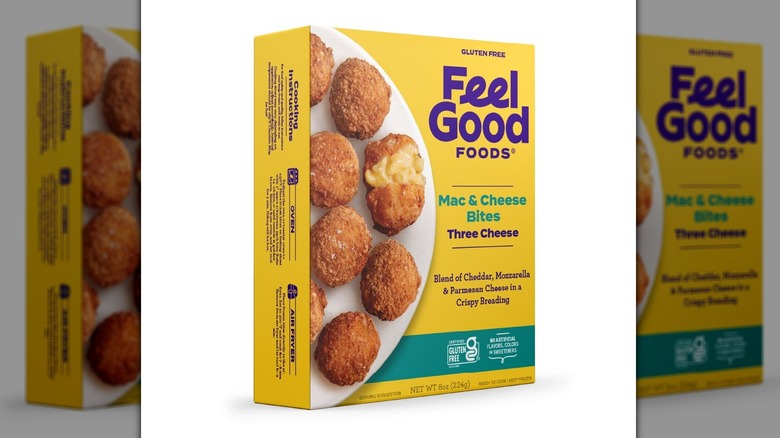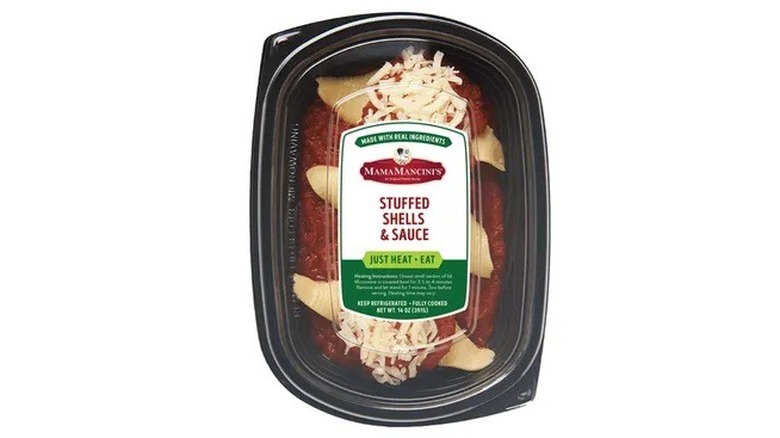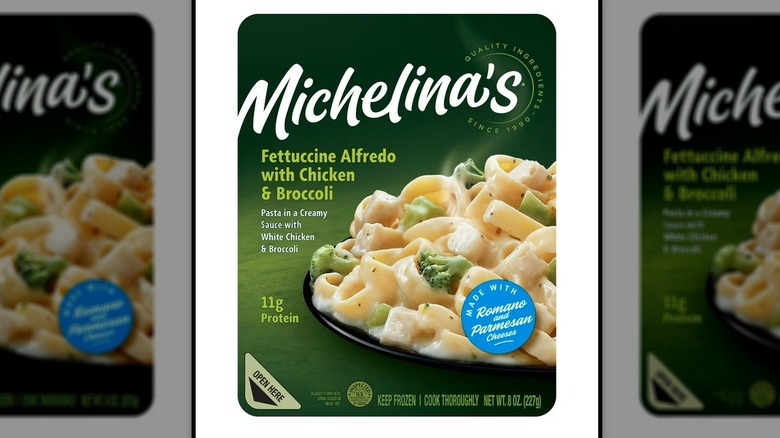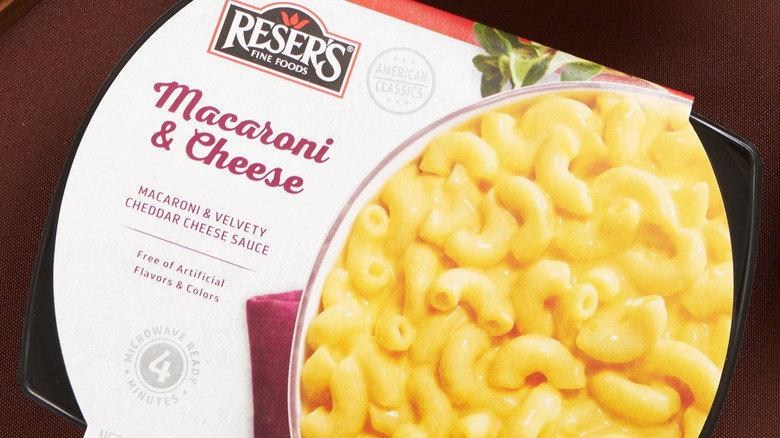17 Of The Worst Pasta Recalls That Have Hit The US
We may receive a commission on purchases made from links.
Pasta is one of the greatest comfort foods ever to hit a plate: It's warming, filling, and endlessly delicious. Not everyone has the culinary chops to rustle up fresh pasta without making mistakes, but that's where the joy of convenience foods come in. Our supermarket shelves are stacked with a wide range of ready-to-eat types of pasta — just throw a handful into some hot water and you're done. If even that's too much hard work, hundreds of brands have created pasta-packed ready meals that we can toss into the microwave and enjoy.
It's easy to forget that even industrially produced pasta needs a little TLC. For a start, it contains eggs, which can be a deadly ingredient if not properly controlled. Then there's the risk of external contamination, such as metal or plastic: That happens more often than you'd think. Suddenly your delicious bowl of summery pasta salad has gone from kitchen staple to the center of a nationwide alert. Let's take a look at 17 of the worst pasta recalls that have hit the United States.
Seviroli Foods' Chicken Alfredo (2024)
In October 2024, food processing company BrucePac issued a recall involving almost 10 million pounds of meat, after Food Safety and Inspection Service tests came back positive for foodborne bacteria listeria. Among the 75 products affected were 1.36 million pounds of chicken Alfredo kits from Seviroli Foods, which issued its own recall notice at the same time.
A spokesperson for the company told Newsweek that, while the chicken was to blame for the contamination, it was only responsible for the pasta in the meals. The Food and Drug Administration said the recall, which affected 15 states, was a Class I risk, the highest that can be issued, and anyone eating the potentially tainted pasta ready meal could experience serious health problems or even die. Listeria can be hard to detect, as it can survive the deep cold of freezers. It can cause vomiting and diarrhea, while severe cases can lead to brain and/or blood infections.
Conagra Brands' Spaghetti and Meatballs (2017)
In June 2017, Conagra Brands, Inc. hit the headlines after it issued a nationwide recall of roughly 717,338 pounds of spaghetti and meatballs, affecting eight brands, including Libby's, Hannaford, and Food Club. The reason? The breadcrumbs used in the pasta products could have contained milk which, if it is declared on the label, isn't a problem. However, the spaghetti and meatballs in this recall did not. Conagra Brands erred on the side of caution and put out the recall notice.
Millions of people in the United States have some level of allergy to cow's milk. Symptoms vary between patients but can include everything from hives to wheezing and, in extreme cases, anaphylaxis. In a statement issued at the time of the recall, Conagra Brands apologized to consumers for any inconvenience and stated that they responded as fast as they could.
D'Orazio Foods' Frozen Stuffed Pasta (2011)
More than 3,000 agencies and organizations work at the local, state, and federal level to ensure all food manufactured in the United States is safe to eat. That sounds like a lot, until you consider there are more than 1 million places selling or serving food across the country, so it's understandable that some things could slip through the net. In December 2011, New Jersey-based D'Orazio Foods recalled around 161,000 pounds of frozen stuffed pasta products which had been manufactured without federal inspection.
A routine safety audit by the Food Safety and Inspection Service found that batches of frozen sausage and beef ravioli under the Albertsons' and Jewel brands, as well as Our Family beef ravioli, were produced when "agency inspection personnel were not on site." The recall affected seven states, but was deemed a Class II, or low-risk, event.
Lean Cuisine Butternut Squash Ravioli, Lean Cuisine Spinach Artichoke Ravioli, Stouffer's Chicken Lasagna party size (2025)
We've all been there. Chowing down on a tasty plate of food and suddenly we feel something in our mouths that shouldn't be there. More often than not it's our own hair — which is gross enough — but occasionally it's something else. In March 2025, several consumers complained to Nestlé USA about foreign objects that looked like wood in their food, prompting the company to issue a nationwide recall, affecting three Lean Cuisine products and the Stouffer's Party Size Chicken Lasagna.
The Lean Cuisine recall included batches of the butternut squash ravioli and spinach artichoke ravioli ready meals. According to the FDA, Nestlé USA said it took action after the complaints and "one potential choking incident to date," adding it was "confident that this is an isolated issue," and reassured consumers that it would cooperate fully with the FDA and Department of Agriculture.
Home Maid Ravioli (2016)
Product recalls are hugely bad for business: They are often expensive and can do serious damage to a brand's reputation. Most of the time, they're triggered by single issues — but in January 2016, California's Home Maid Ravioli Company demonstrated they can also involve multiple problems. It was forced to recall roughly 34,200 pounds of beef ravioli products because of the presence of whey.
The nine affected pasta products also contained pork and neither it nor the whey had been listed on the ingredients label. As if all that wasn't enough of a headache, the items under the recall notice had been produced without the required federal inspection. Just when the company thought it couldn't get any worse, four days after the initial recall notice, another was issued. This included an additional nine products, taking the total recall to 38,950 pounds of meat and pasta products.
Lean Cuisine Fettuccini Alfredo (2020)
For years, many decent family meals relied on meat, potatoes, and not much else. Today, there are a vast range of lifestyle choices — as well as specialist diets due to allergies — for food manufacturers to be aware of. In May 2020, Nestlé USA was forced to issue a recall notice for just over 29,000 pounds of Lean Cuisine fettuccini Alfredo products, following numerous consumer complaints.
It emerged that the ready meal – pasta in a creamy cheese sauce — contained undeclared soy, which is potentially harmful to people who are allergic. But that wasn't the only problem. The vegetarian meals had also been made with chicken, which wasn't listed on the label. Nestlé USA confirmed a packaging error was behind the latter issue, and although it upset vegetarian consumers, the company added it had received no reports of anyone having an unfavorable reaction to the undeclared soy in the pasta product.
Melissa's Pasta Para Duros (2022)
One of the most fun things about pasta is the variety of shapes it comes in. However, anyone who bought a bag of Melissa's Pasta Para Duros — which are mini cartwheels — around December 2022 wasn't laughing. That's because World Variety Produce, Inc., the company behind the Melissa brand, issued a recall that affected a whopping 11,524 pounds of pasta.
It emerged the cartwheels may have contained wheat, potentially putting at risk the estimated 6% of people in the United States who are sensitive to gluten, and the roughly 3 million who have celiac disease. The affected bags of Melissa's Pasta Para Duros were sold across six states, including Illinois and Ohio. Consumers were advised to double bag the product and throw it in the trash, or take it back to the store where they bought it for a full refund.
Avanza Pasta Ravioli and Tortellini products (2021)
It's bad enough when a problem with food production is spotted quickly and a recall notice is sent out that covers a manufacturing period of perhaps a few weeks. On March 22, 2021, Avanza Pasta issued a recall of 2,237 pounds of ravioli and tortellini products that had not been assessed by the Food Safety and Inspection Service. The move affected 17 brands, including Avanza Pasta and Frank's Deli, which were sent to Illinois, Indiana, and Wisconsin.
The really bad news? The recall covered pasta products that were made between October 2019 through early March 2021, and officials feared tainted items may be lurking in unsuspecting consumers' freezers. To reflect that concern, eight days after the initial recall, Avanza Pasta increased the number of items to 9,847 pounds of pasta products, and advised people to either throw them away or take them back to the store where they bought them.
Whitsons Food Service Chicken Alfredo (2023)
It can be irritating (and disruptive) for consumers when foods sold at stores are recalled because of mistakes — but what about those served up in schools or other institutions? In February 2023, almost 9,000 pounds of frozen chicken Alfredo with broccoli and penne pasta ready meals were distributed to schools across Pennsylvania and New York, according to the Food Safety and Inspection Service.
After a customer complained to Whitsons Food Service, it emerged that the aforementioned pasta meals contained egg, which had not been listed on the product label. Whitsons investigated and found that the sauce had been changed and it now included egg. However, nobody thought to inform the company's nutrition department, so the label had not been updated. People with a sensitivity or allergy to eggs who unwittingly eat them can suffer digestive issues or skin rashes, and in severe cases, anaphylaxis. Luckily, no reports of illness or reactions were reported.
Caesar's Pasta, Frozen Manicotti (2022)
Pasta lovers know the pleasure that only a forkful of stuffed manicotti can deliver. Unfortunately, December 2022 was a date to forget for Caesar's Pasta, after it had to recall 5,610 pounds of the frozen pasta tubes. A routine inspection found they had been potentially contaminated with listeria, bacteria that can cause nasty stomach upsets in young children and healthy people, but which can also be potentially deadly to the elderly, immunocompromised, or fetuses.
The potentially contaminated pasta was branded as Orefresco and Caesar's Pasta, and shipped across Philadelphia, as well as to markets in New York State and Puerto Rico. Symptoms of listeria poisoning can take up to 70 days to emerge, but no illnesses were reported after the recall and the restaurants and foodservice distributors who received the pasta were advised to throw it in the trash.
Mrs Pasta frozen meat pasta products (2023)
Paperwork can be a headache but when it comes to food production, it can be a vital safety net for both the public and companies. In 2023, the Florida Department of Agriculture and Consumer Services notified the Food Safety and Inspection Service (FSIS) about several batches of meat pasta products that appeared to have been officially inspected, but the production facility number was wrong. Digging deeper, FSIS discovered that a mistake had been made.
That October, Massimo & Umberto's Mrs Pasta brand issued a recall for 4,544 pounds of classic frozen pasta dishes, comprising squared and halfmoon versions of veal ossobuco ravioli, tortellini Bolognese, and short ribs ravioli. All three had been sent to restaurants, retailers, and distributors across Florida — anyone who had bought the affected Mrs Pasta products was urged to throw them in the trash. FSIS said at the time there were no reports of anyone falling ill or having a negative reaction to the recalled pasta dishes.
Michelina's Spaghetti with Meat Sauce (2021)
Although soy is listed among the "Big 8" allergenic foods in the United States, it might be considered among the least prevalent, according to Soy Nutrition Institute Global. However, that doesn't prevent it from being a health risk, particularly to infants. So, in May 2021, when 8.5-ounce trays of Michelina's Spaghetti with Meat Sauce — which should not contain soy — was tainted with ingredients that did, Ohio-based Bellisio Foods had no choice but to issue a recall.
People who are allergic to soy can have symptoms including stomach cramps and eczema — in extreme cases, they can experience anaphylaxis. Bellisio Foods recalled almost 4,000 pounds of its spaghetti and meatballs, which had been sent out to stores across the country. Consumers who had bought the tainted products were urged to throw them in the trash. No adverse reactions were reported.
Kraft Original Mac & Cheese (2015 and 2024)
Boxed mac & cheese has to be one of the all-time best comfort foods ever. You can eat it as it comes or take it to the next level with a simple addition. What you don't want is to find bits of metal in your pasta — but that's what happened in March 2015. The Kraft Foods Group had to recall around 242,000 cases of its original flavor mac & cheese that had been distributed across the United States, Puerto Rico, and other countries.
The company apologized after eight customers had complained about finding metal in the long-lasting boxes of pasta. However, almost nine years later, a similar incident resulted in 6 million boxes — more than 200,000 cases — being recalled. Kraft Foods' spokeswoman Joyce Hodel told the Los Angeles Times in an email that: "We believe a piece of stainless steel got wedged in a metal piece of equipment, which may have generated friction that resulted in small pieces of metal potentially falling into the product." No injuries were reported in either incident.
Feel Good Foods Three Cheese Mac & Cheese Bites (2025)
Some brands have gone all out to ensure anyone with special dietary needs can enjoy the widest range of foods and snacks. For people with celiac disease, Feel Good Foods' range of breakfast items, savory snacks, and delicious, filling burritos, was right on the money. Although their products contain no gluten, in 2025, something did sneak into the company's Three Cheese Mac & Cheese Bites during production, leading to a recall of 4,246 cases.
The low-risk Class II recall was prompted by the possible contamination of snacks by small metal pieces. The affected products, which have best by dates of June 19, 2026 or June 20, 2026, were shipped nationwide to a range of stores, including Target, Wegmans, and Whole Foods. Anyone who had an affected box of the pasta snacks was advised to either throw them away or take them back to the store where they bought them.
Hungryroot Ricotta Stuffed Shells and Mama Mancini's Stuffed Shells with Sauce and Mozzarella Cheese (2024)
In 2023, there were five recalls across the United States prompted by potential listeria contamination, affecting 78,708 pounds of food. When the figures for 2024 are published, Joseph Epstein Food Enterprises, Inc. will be among the contributors. In December that year, the distribution company recalled 1,170 cases respectively of Mama Mancini's stuffed shells with sauce and mozzarella cheese, and Hungryroot ricotta stuffed shells.
The Class II recall covered products shipped to six states, including Arizona, Minnesota, and California. Although the company didn't say how the potential contamination came to light, a spokesperson for Mama Mancini's Holdings told Newsweek: "Importantly, no recalled product reached retail consumers. All affected product was quarantined and recalled before it was distributed to end consumers."
Michelina's Fettuccine Alfredo with Chicken & Broccoli (2024)
October 2024 was a tough month for Bellisio Foods. It was caught up in the huge, nationwide recall of ready meals produced by BrucePac that affected 10 million pounds of meat. Nine pasta dishes, including Michelina's Fettuccine Alfredo with Chicken and Broccoli, were among 21 Bellisio products that had been potentially contaminated with listeria bacteria.
The company sent out a Class I recall notice, defined by the FDA as "a reasonable probability that the use of, or exposure to, a violative product will cause serious adverse health consequences or death," across eight states. Consumers who had bought any of the potentially affected pasta meals were strongly advised not to eat them but to return them to the stores and get a full refund.
Reser's American Classics Macaroni & Cheese (2024)
Many food production facilities in the United States have the most rigorous hygiene and manufacturing processes, but it's all for naught when transportation technology breaks. Reser's Fine Foods had to issue a recall in July 2024 after a delivery truck's refrigeration unit malfunctioned. It was carrying pasta salad and other chilled products, as well as its American Classics Macaroni & Cheese, and American Classics Macaroni & Cheese White Cheddar ready meals.
Listeria bacteria can develop in foods that are supposed to be kept cool but remain for too long at room temperature. The pasta meals were shipped to five states – and a spokesperson for Reser's Fine Foods said the Class II incident affected a single truck load of product which was never sold in stores, because it didn't make it out of the distributor's location.


